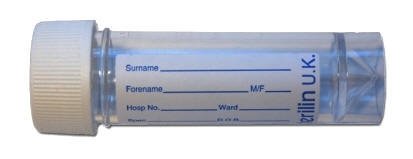Mucopolysaccharides
Chemical Pathology
Notes
Mucopolysaccharidoses are a group of rare inherited disorders caused by lack of specific lysosomal enzymes that degrade the complex carbohydrates known as glycosaminoglycans (GAG's, or mucopolysaccharides).
GAG's are important in the structure of connective tissue; however in these disorders they accumulate in the lysosomes resulting in damage to various tissues and progressive disability in the patient.
Laboratory investigation and diagnosis is based on detection in urine of either excess amounts of GAG's or different relative proportions to age matched controls followed by confirmation using specific enzyme analysis.
Sample requirements
5mL early morning urine (sample must be adequately concentrated, with urine creatinine > 1.0 mmol/L for analysis), taken into a white top Universal

Storage/transport
Send at ambient temperature to the laboratory. If unavoidable, samples can be stored refrigerated overnight.
Required information
Relevant clinical details, especially any learning difficulties, autism or dysmorphic features.
Turnaround times
Samples are sent for analysis to University Hospital Bristol NHS Trust with results expected back within 2 weeks.
Reference ranges
| Age | Upper limit of normal mg GAG/mmol creatinine |
|---|---|
| < 6 months | <30 |
| 6 - 12 months | <26 |
| 1 - 3 years | <21 |
| 3 - 5 years | <14 |
| 5 - 8 years | <11 |
| 8 - 16 years | <9 |
| >16 years | <3 |
Follow up 2D-electrophoreisis is performed as appropriate, to avoid missing attenuated forms in which the GAG:creatinine ratio is normal but abnormal GAG's are excreted.
Further information
To learn more visit the website of The National Metabolic Biochemistry Network, also visit the MPS Society webpage